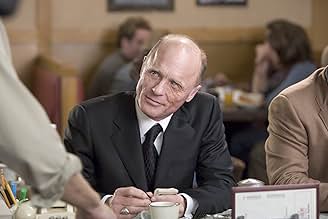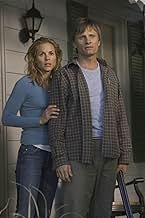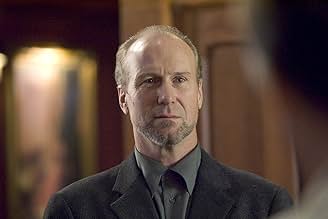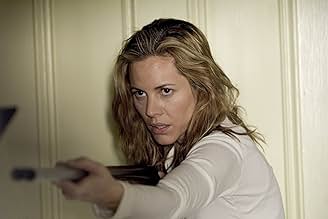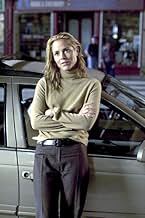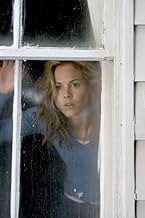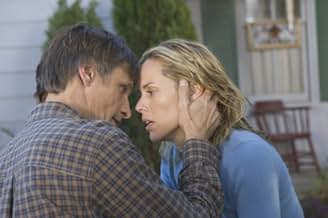A mild-mannered man becomes a local hero through an act of violence, which sets off repercussions that will shake his family to its very core.A mild-mannered man becomes a local hero through an act of violence, which sets off repercussions that will shake his family to its very core.A mild-mannered man becomes a local hero through an act of violence, which sets off repercussions that will shake his family to its very core.
- Director
- Writers
- Stars
- Nominated for 2 Oscars
- 37 wins & 84 nominations total
- Director
- Writers
- All cast & crew
- Production, box office & more at IMDbPro
Featured reviews
10gsygsy
This is, like all Cronenberg's work, a mythic movie. It occupies the world of "monsters" that Tom Stall's daughter dreams about at the start. It's as if we get to see the little girl's nightmare as the film unfolds. It's because of this poetic, super-real quality that criticisms from the "this isn't real life" brigade have no relevance. The screenplay is exceptionally tight and well-woven - no image is wasted. The subplot of the son's troubles with a school bully parallels the main plot. The very existence of the son is there to show the inheritance - the history - of violence. The sex scenes are there to show the proximity of lust and violence. The end can be nothing other than what it is: as someone else on IMDb has commented, the genie is out of the bottle. This is true for the family in the film, the society we see surrounding the family, and it's true for our families and our society. It's about the inexhaustible rage of humans. It couldn't be more relevant, it couldn't be more timeless. It is well acted and beautifully photographed. I have some minor reservations - did we really need so much of Howard Shore's music? - but on the whole I think this is a superb film. Not for the kiddies, however.
I honestly don't understand why this movie has such a big score. I was hoping for intrigue. But this movie is so plain and basic. Even acting was poor.
In the first fifteen minutes of "A History of Violence," we get a small town diner, a baseball game, and a sneering, varsity letter-wearing high school bully. Throw in an apple pie on a window sill and some kids saying bedtime prayers, and you've got the Saturday Evening Post. But this is the work of David Cronenberg, whose films so often explore the blurry – and icky – lines between biology and technology. So it's not surprising when this film, too, heads for the gray areas, this time between the sensibilities of Rockwell and Tarantino.
Small town diner owner Tom Stalls (Viggo Mortenson) runs the kind of place where you can eat at the counter, and "see you in church" is a standard goodbye. When he single-handedly foils a robbery and saves a few lives, then, the townsfolk are impressed and grateful, but not all that surprised. Tom is a Man, after all, and that's what Men do. But as David Lynch has taught us, pastoral postcard America often conceals deep weirdness and violence. The diner incident is of course big news in Anytown, USA, and Tom finds himself attracting not only local reporters who want to know "how it felt," but also the Reservoir Dog-type Mr. Foggerty (Ed Harris), who isn't surprised that Tom knows his way around a gun, and waxes nostalgic about good times in Philadelphia involving barbed wire and a guy named Joey Cusack. Foggerty seems to think Tom knows exactly what he's talking about.
Tom as "local hero" his family can handle, but after the Foggerty matter comes to a head, they do begin to wonder where these moves that would make Jeff Speakman proud are coming from. Perhaps more unsettling is the fact that they unconsciously sort of get off on their new image of dad. Junior soon finds in himself the will to flatten his jock tormentor, and wife Edie (Maria Bello) with some gusto acts out a rough rape fantasy with her hubby. Tom Stalls, indeed, but can't prevent the inevitable truth from coming to light nor catching up with him. That's shocking enough to his family, though maybe less so than the ways that knowledge affects them.
"A History of Violence" is fond of feinting toward familiar territory, only to veer away. Just when we think we've seen if before, in "Natural Born Killers," "Cape Fear," and the "just when I think I'm out, they pull me back in" tropes of countless mob flicks, it shifts its focus. For all its brutality, it comes across as a quiet movie. There is indeed more to Tom than he lets on, but less than his detractors might believe. He may be a liar in the strictest sense, but his protestations to his family and persecutors are sincere. The contemplation of violence, both pre and post-facto, rather than the acts themselves, drive the film. Whether the capability for, and indeed commission of, such acts permanently defines a person is left for us to decide. The film ends ensconced once again in small town tranquility, though this time seething with unspoken fear, accusations, and uncertainty. "A History of Violence" doesn't force itself with preaching or moralizing, but simply unfolds. It's another solid offering from the strong career of David Cronenberg.
Small town diner owner Tom Stalls (Viggo Mortenson) runs the kind of place where you can eat at the counter, and "see you in church" is a standard goodbye. When he single-handedly foils a robbery and saves a few lives, then, the townsfolk are impressed and grateful, but not all that surprised. Tom is a Man, after all, and that's what Men do. But as David Lynch has taught us, pastoral postcard America often conceals deep weirdness and violence. The diner incident is of course big news in Anytown, USA, and Tom finds himself attracting not only local reporters who want to know "how it felt," but also the Reservoir Dog-type Mr. Foggerty (Ed Harris), who isn't surprised that Tom knows his way around a gun, and waxes nostalgic about good times in Philadelphia involving barbed wire and a guy named Joey Cusack. Foggerty seems to think Tom knows exactly what he's talking about.
Tom as "local hero" his family can handle, but after the Foggerty matter comes to a head, they do begin to wonder where these moves that would make Jeff Speakman proud are coming from. Perhaps more unsettling is the fact that they unconsciously sort of get off on their new image of dad. Junior soon finds in himself the will to flatten his jock tormentor, and wife Edie (Maria Bello) with some gusto acts out a rough rape fantasy with her hubby. Tom Stalls, indeed, but can't prevent the inevitable truth from coming to light nor catching up with him. That's shocking enough to his family, though maybe less so than the ways that knowledge affects them.
"A History of Violence" is fond of feinting toward familiar territory, only to veer away. Just when we think we've seen if before, in "Natural Born Killers," "Cape Fear," and the "just when I think I'm out, they pull me back in" tropes of countless mob flicks, it shifts its focus. For all its brutality, it comes across as a quiet movie. There is indeed more to Tom than he lets on, but less than his detractors might believe. He may be a liar in the strictest sense, but his protestations to his family and persecutors are sincere. The contemplation of violence, both pre and post-facto, rather than the acts themselves, drive the film. Whether the capability for, and indeed commission of, such acts permanently defines a person is left for us to decide. The film ends ensconced once again in small town tranquility, though this time seething with unspoken fear, accusations, and uncertainty. "A History of Violence" doesn't force itself with preaching or moralizing, but simply unfolds. It's another solid offering from the strong career of David Cronenberg.
10xNINx
I read through a lot of these comments, and it seems quite a few people who have given this film a bad rating based their judgment on either the sex scenes, or the gore (or both). Well, it's called "A History of Violence", and it's directed by David Cronenberg! What did they expect? The film is, simply put, amazing. Anyone who enjoys Cronenberg's other films will greatly appreciate this one. It speaks on many levels, and I suggest seeing it more than once to fully take it all in. Beautiful performances all around. I felt as though that is how people put in a situation like that would really act. I had a smile on my face the entire film because I have been waiting all summer (or longer) for a film of this caliber, and it was worth it.
We are in a a small community driven town, restaurant owner Tom Stall becomes the hero of the town when he shoots and kills two murdering robbers at the restaurant. Not long after, facially scarred Carl Fogarty arrives in town proclaiming that Tom is actually a former gangster from Philadelphia who needs to go back to pay his dues. As Fogarty and his Hench Men put the pressure on, Stall and his family are in danger of being overwhelmed with violence and mistrust.
One thing that can never be said about David Cronenberg is that he is a very predictable director, his output of course, if we are all honest, is very up and down, bewildering critics and fans in equal measure. Thankfully A History Of Violence finds Cronenberg on particularly devilish form, taking the graphic novel origins of the piece, written by John Wagner & Vince Locke, and crafting a modern day Western that is using violence as some sort of escalating disease. This is the point surely? The graphic violence (handled with morose tension by Cronenberg) is the main character in the film, regardless of any past history that Stall may have had, the violence arrives into this family, totally unwanted and unexpected, and then latches on to them to maybe destroy them?
With that point of interest to note, A History Of Violence can be seen as a blood brother to Cronenberg's wonderful remake of The Fly, the unwanted entering the fray and spreading its disease to the point of no return. There is the use of the husband and wife's ongoing sex life as a seriously smart strand in the escalating story, where once at the beginning there is fluffy erotic intercourse, then the on going danger in their lives brings darkness and borderline sadism, it's very relevant, as is the son axis as he goes through a dramatic change when the violence and threats engulf the family. Cronenberg gleefully ties all the murky threads together to ask us for a reaction to the violence up there on the screen.
The cast, with the exception of a fish out of water performance from Ashton Holmes as the son, Jack, is fine. Viggo Motensen plays the duality of the role as Tom Stall with much verve, while Maria Bello shows exactly why she shouldn't be working for food in hopeless miscast assignments like The Mummy 3. Ed Harris gives us a nice line in villain duties, and William Hurt crops up late in the piece to almost steal the film with his darkly disturbing menacing point of worth. Peter Suschitzky's photography enhances the primary colours for added impact when the mood swings down dark roads, and Howard Shore's musical score is constantly ominous, where he blends his own score for Silence of the Lambs with a sort of Berlioz like edginess.
All in all it's a very interesting and sneakily crafty picture that above all else shows that when on form, Cronenberg still has very much to offer modern age cinema. Now, about Straw Dogs? 8.5/10
One thing that can never be said about David Cronenberg is that he is a very predictable director, his output of course, if we are all honest, is very up and down, bewildering critics and fans in equal measure. Thankfully A History Of Violence finds Cronenberg on particularly devilish form, taking the graphic novel origins of the piece, written by John Wagner & Vince Locke, and crafting a modern day Western that is using violence as some sort of escalating disease. This is the point surely? The graphic violence (handled with morose tension by Cronenberg) is the main character in the film, regardless of any past history that Stall may have had, the violence arrives into this family, totally unwanted and unexpected, and then latches on to them to maybe destroy them?
With that point of interest to note, A History Of Violence can be seen as a blood brother to Cronenberg's wonderful remake of The Fly, the unwanted entering the fray and spreading its disease to the point of no return. There is the use of the husband and wife's ongoing sex life as a seriously smart strand in the escalating story, where once at the beginning there is fluffy erotic intercourse, then the on going danger in their lives brings darkness and borderline sadism, it's very relevant, as is the son axis as he goes through a dramatic change when the violence and threats engulf the family. Cronenberg gleefully ties all the murky threads together to ask us for a reaction to the violence up there on the screen.
The cast, with the exception of a fish out of water performance from Ashton Holmes as the son, Jack, is fine. Viggo Motensen plays the duality of the role as Tom Stall with much verve, while Maria Bello shows exactly why she shouldn't be working for food in hopeless miscast assignments like The Mummy 3. Ed Harris gives us a nice line in villain duties, and William Hurt crops up late in the piece to almost steal the film with his darkly disturbing menacing point of worth. Peter Suschitzky's photography enhances the primary colours for added impact when the mood swings down dark roads, and Howard Shore's musical score is constantly ominous, where he blends his own score for Silence of the Lambs with a sort of Berlioz like edginess.
All in all it's a very interesting and sneakily crafty picture that above all else shows that when on form, Cronenberg still has very much to offer modern age cinema. Now, about Straw Dogs? 8.5/10
Did you know
- TriviaWilliam Hurt received an Oscar nomination for this film for Best Supporting Actor despite only being in one scene which lasted less than 10 minutes.
- Goofs(at around 1h 4 mins) When Sam the Sheriff comes to the house for the second time (after the second batch of killings), he parks diagonally at the beginning of the driveway, essentially blocking the entrance to the driveway. He and Tom go into the house to talk, and while they are talking, Edie pulls into the garage, parks and comes into the house. She could not have pulled into the garage with the Sheriff's car blocking the driveway.
- Quotes
[last lines]
Richie Cusack: [Joey holds a gun to Richie's head] Jesus, Joey.
Tom Stall: [as Joey shoots Richie in the head, then stands over his dead body] Jesus, Richie.
- Alternate versionsThere are some minute differences between the US and the International version when it comes to some of the violent scenes:
- Fogarty's thug, who gets his nose smashed into his skull has more blood spurt out in the International version in the shot where he is dying on the ground.
- When Joey stomps on Richie's thug's throat, he spits blood (instead of it 'welling up') and the sound effect of the neck breaking is louder. Both shots last the same length of time and use the same take, the amount of blood was simply toned down digitally for the MPAA. Most video versions outside the U.S. use the 'international version' but the shots appear in the supplements on the U.S. DVD (In the featurette titled 'Violence's History', Cronenberg shows the U.S. and international cut scenes side by side and explains the reason why there wasn't a standard 'unrated' version in the U.S. was because the changes were so small).
- ConnectionsEdited into A History of Violence: Deleted Scene - Scene 44 (2006)
- How long is A History of Violence?Powered by Alexa
Details
- Release date
- Countries of origin
- Official site
- Language
- Also known as
- Una historia violenta
- Filming locations
- Production companies
- See more company credits at IMDbPro
Box office
- Budget
- $32,000,000 (estimated)
- Gross US & Canada
- $31,504,633
- Opening weekend US & Canada
- $364,000
- Sep 25, 2005
- Gross worldwide
- $61,385,065
- Runtime1 hour 36 minutes
- Color
- Sound mix
- Aspect ratio
- 1.85 : 1
Contribute to this page
Suggest an edit or add missing content







